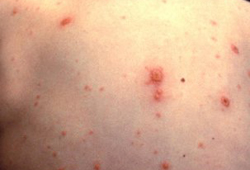Summary
Definition
History and exam
Key diagnostic factors
- history of exposure
- fever
- vesicular rash
- vesicles on mucous membranes
Risk factors
- exposure to varicella
- age 1 to 9 years
- unvaccinated status
- occupational exposure
Diagnostic tests
Tests to consider
- polymerase chain reaction
- viral culture
- direct fluorescent antibody testing (DFA)
- Tzanck smear
- latex agglutination (LA)
- enzyme-linked immunosorbent assay (ELISA)
- complement fixation
- ultrasound (pregnant women)
Treatment algorithm
Contributors
Authors
Andrew Riordan, MD, FRCPCH, MRCP, DTM&H
Consultant in Paediatric Infectious Diseases and Immunology
Royal Liverpool Children's Hospital (Alder Hey)
Liverpool
UK
Disclosures
AR declares that he has no competing interests.
Acknowledgements
Dr Andrew Riordan would like to gratefully acknowledge Dr Steven Pergam, Dr Rupali Jain, and Dr Anna Wald, previous contributors to this topic.
Disclosures
SP has served as a consultant for Merck & Co., Inc, Optimer/Cubist, and Chimerix, and has participated in clinical trials with these three organizations. He is also an author of a paper cited in this topic. RJ declares that she has no competing interests. AW is a member of the Data and Safety Monitoring Board (DSMB) for a Merck study of a candidate VZV vaccine.
Peer reviewers
Chad M. Hivnor, Major, USAF, MC, FS
Chief
Outpatient & Pediatric Dermatology
59th Medical Wing/ SGOMD
Lackland Air Force Base
San Antonio
TX
Disclosures
CMH declares that he has no competing interests.
Use of this content is subject to our disclaimer
